How to Become A Persuasive Speaker
Why is Persuasive Speaking Important?
This may seem like an obvious question, however lets still answer it. If we can convince others to see our way of thinking or to do things that will be in their interests, we will become much more effective leaders and communicators. Indeed, becoming skilled in persuasion, and knowing how to become a persuasive speaker will set you up for a more rewarding career and life.
What is Persuasive Speaking?
The best description of persuasive speaking is “a specific type of speech in which the speaker has a goal of convincing the audience to accept his or her point of view or to take a specific action”
Sometimes people see persuasion as manipulation. There are similarities in the approaches used, however the main difference between persuasion and manipulation is whose interests are you serving. If you are convincing people to do something that is not in their interest, then this is manipulation. On the other hand, it is persuasion if you can convince people of something that is in their interest.
How to Become a Persuasive Speaker?
In broad terms, learning how to become a persuasive speaker fits around six principles laid out by Robert Cialdini, renowned psychologist and marketing expert. He states that these are as follows:
Authority.
Nobody is going to listen to our speech if we don’t sound like we know what we’re talking about. Look at any advertisement on TV, or testimonials on online marketplaces. They nearly always have a seal of approval from an industry professional. We tend to do the same when we try to persuade others of our point of view; we want them to think we’re in the know so they’ll be more comfortable with being led.
Social Proof
It’s harder to persuade someone to do something if they are embarking on this alone. It’s much easier when they think others are involved. These could be celebrities, colleagues, competitors, or friends.
Under no circumstances should we lie; it’ll always come back to haunt us. But get some more easily convinced people on board first, and use that to one’s advantage, especially when trying to persuade a team player. If they think they’re missing out, they’ll want in.
Consistency.
Who is going to be persuaded by our speech or pitch if the numbers don’t match up to what we told them last time? For this reason, it’s important to allow people to manage expectations from the start. If we promise an over the top reward for someone helping us out, we are going to be expected to come up with the goods time and time again. Look at the bigger picture and think, “what is persuasive speaking?” Is it telling people what they want to hear or building up trust over time?” It is, of course, the latter. And remembering that will see persuasion come so much easier.
Scarcity.
Why is scarcity important in persuasive speaking? Put simply, people will be more persuaded or convinced if they feel that the offer or deal will not be around forever. Putting a deadline or finite amount of time on something for someone to make a decision will help people decide more quickly, and normally in the suggested direction. Why? Because when something is scare it becomes more desirable.
Liking.
There’s no denying that people are more easily convinced and persuaded by people they like. We’re not talking about a ‘social chameleon’ setup where we try and be everyone’s best friend; more, we let our genuine good qualities shine, such as honesty, openness, confidence and affability. People will say ‘yes’ if they think they relate to the person asking.
Reciprocity.
This falls into two categories. The first is the notion that, by helping us, people will potentially be owed a favour or will see a favour instantly returned if they help us. A “you scratch my back, I’ll scratch yours” approach. How many times have we said to someone, “I’ll owe you one” as we know it will seal the deal? The second type of reciprocity is the ‘calling in a favour’ approach. Put simply, we let the person feel that they have a sense of obligation. There’s nothing inherently dishonest about either if the favours are genuine!
Summary
Using these six points may not sound like an easy task. However, once we recognise and practice them, it can be. But it is as much about knowing when and where to use these principles, and when to combine them, to truly become a persuasive speaker. Look at the challenge, see what it calls for and tailor the approach accordingly. The ‘yes’ count will nearly always go up.



